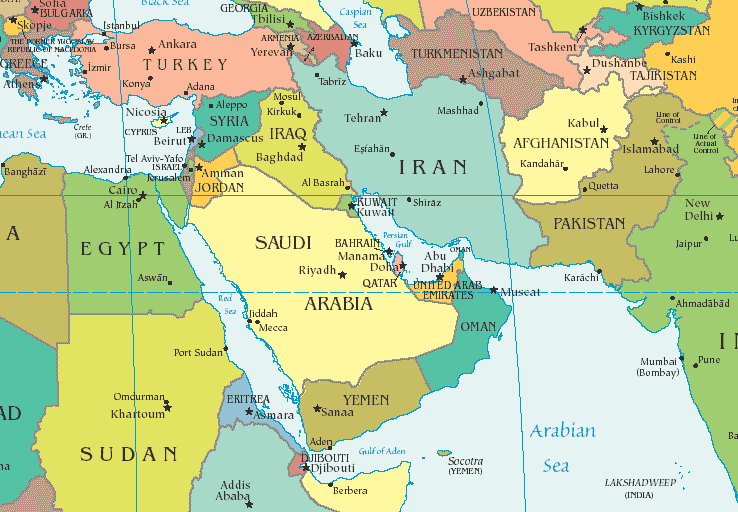US Negotiating Saudi-Egypt-Israel Accord
Another potential deal that doesn't address the central issue.

Axios (“Scoop: U.S. negotiating deal among Saudis, Israelis and Egyptians“):
The Biden administration has been quietly mediating among Saudi Arabia, Israel and Egypt on negotiations that, if successful, could be a first step on the road to the normalization of relations between Saudi Arabia and Israel.
It involves finalizing the transfer of two strategic islands in the Red Sea from Egyptian to Saudi sovereignty, five U.S. and Israeli sources told Axios.
Why it matters: If an arrangement is reached, it would be a significant foreign policy achievement for the Biden administration in the Middle East.
The U.S. and Israeli sources said the agreement is not complete and the sensitive negotiations are ongoing, according to the U.S. and Israeli sources who are knowledgeable about the negotiations but who are not at liberty to publicly discuss them. The White House wants an agreement to be reached before President Biden’s upcoming trip to the Middle East at the end of June, which could include a stop in Saudi Arabia, according to the sources.
The Tiran and Sanafir islands control the Straits of Tiran — a strategic sea passage to the ports of Aqaba in Jordan and Eilat in Israel. Saudi and Egyptian officials say Saudi Arabia gave Egypt control of the islands in 1950. They were later demilitarized as part of the 1979 Israeli-Egyptian peace treaty.
The White House and the Israeli prime minister’s office declined to comment. The embassies of Saudi Arabia and Egypt did not immediately respond to a request for comment.The big picture: According to the sources, the Biden administration believes finalizing an arrangement could build trust between the parties and create an opening to warm relations between Israel and Saudi Arabia, which do not have official diplomatic relations.
It would be the most significant U.S. foreign policy achievement in the Middle East since the Abraham Accords, which were brokered by the Trump administration and led to normalization agreements between Israel, the United Arab Emirates, Bahrain and Morocco.
Saudi Arabia supported the Abraham Accords but made it clear at the time they wouldn’t normalize relations with Israel unless there was serious progress in the Israeli-Palestinian peace process.
Successful negotiations could also lower tensions between the Biden administration and Saudi Arabia.Biden once vowed to make Saudi Arabia a “pariah” and relations have been strained over a number of issues, including the kingdom’s human rights record and the murder of Washington Post columnist Jamal Khashoggi. U.S. intelligence says Saudi Crown Prince Mohammed bin Salman is responsible — an allegation Saudi Arabia denies.
All of these deals, going back to the historic Camp David Accords negotiated by President Jimmy Carter in 1979, have been successful save those negotiated with the Palestinians themselves. Those have all fallen apart, owing to the inability of leadership to control extremist factions.
Ultimately, lasting peace in the region is impossible without solving the Palestinian problem. And it gets less solvable with each passing year.
As to the Saudis, it’s long past time to stop pretending they’re allies whose interests are aligned with ours. So long as they’re ruled by a thug regime held hostage by religious extremists, that can never be the case.






Unfortunately, with just a minor modification, this could apply to the entire Middle East:
Except that we do have de facto peace between Israel and all its neighbors aside from Iran, and the Palestinians are irrelevant to Iran except as useful tools to create distractions. The Palestinians have no friends anymore. As the saying goes, they never missed an opportunity to miss an opportunity, and now the world has decided to move on and ignore them.
The Left in the US seems stuck on the idea that Israel is a dependency of the US and we can somehow bully them into creating a Palestinian state. That’s anachronistic thinking. Israel is rich and technologically advanced, with a serious weapons producing capability and very effective military and state security forces. They don’t need our financial aid, and increasingly don’t need our military or diplomatic support.
Palestinians are poor, divided, corrupt and badly-led. The days when Palestinians might have imagined themselves as a potential peer state are over. Now they’re Israel’s Mexico. This state of affairs encourages Israeli indifference and hostility, while for Palestinians their best future lies in diaspora. It’s depressing as hell and injures Israeli democracy, but the eyes of the world have long-since turned away.
@Michael Reynolds: Oh, the fault is largely that of the Palestinians, although the Israelis have been barbarians as well. My point is simply that, until that problem is solved, there will be continued terrorist flare-ups.
Hear! Hear! Unless Saudi Arabia cracks down (and breaks) the Wahabist clerical power I really don’t see a path forward.
The Palestinians are like the Kurds in that they will never have their own homeland and everyone will betray them. Yes, we can blame them for their own situation they are in but that’s the case nonethe less.
@Scott: There is no “clerical power” as there is no clergy. Christians get this wrong again and again – there are no annointed clerics in Islam and anyone can be a preacher. The structure is precisley like the very lowest church Baptists.
The Ibn Saud could withdraw support to the official pet preachers, which can have a long-term effect, but they would need another power base as the Ibn Saud are interlopers, neither Shorfa nor old lineage, their entire rise to power was based on the Wahhabite reaction. Their control if not naked power is via the Wahhabite preachers (who so long as they are given their domestic power turn a blind eye generally to the corrupt habits of the Ibn Saud, should be a familiar idea to Americans relative tto their own Christian supremacist movement).
@Michael Reynolds: the Palestinians are indeed poorly led and structurally impoverished in an occupation set-up really indistinguishable in operational terms from the South Africa Bantustans. Uniquely amongst you, I have been to both, and was an actual investor in the Territories as a PE officer. The poverty of the territories is not abstractable away fomr the reality of the occuption – right down to an expensively dysfunctional electric grid that at once can not be fixed appropriately due to Israeli occuption own rules – with a functionally identical cycle of security response, marginalisation and deliberate occuption choices on marginalisation with a façade of security justification providing the fig leafs.
Obviously a two state solution will never happen and given the settlements, walls, will never work. There are only two paths in reality. One is continued Bantustan policy with an apartheideque state aiming for a barely disguised ethnic cleansing or a federalised single state solution with some kind of protective structures for the two communities – a Bosnia Herzogovinesque solution (I suppose one can pretend to imagine a truly unitary state but that rather strikes me as pure fantasy as something easily literally blown up by the radicals of both camps).